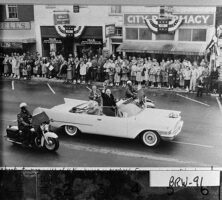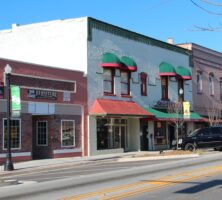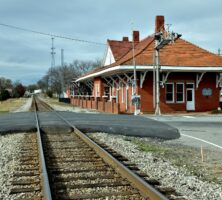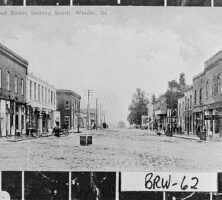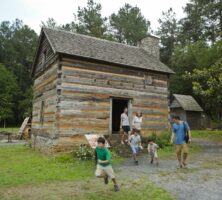Snodon, Jug, Jug Tavern, and Brandon are all former names for the city of Winder, the county seat of Barrow County in northeast Georgia. Encompassing nearly eleven square miles and located forty-two miles northeast of Atlanta, Winder is now considered an Atlanta bedroom community.
Originally Winder extended from the railroad crossing of Broad Street (then Jefferson Road) into three counties—Jackson, Walton, and Gwinnett—which came together at the center of town, causing much confusion in matters of governance. The situation was remedied in 1914 when Governor John M. Slaton signed a constitutional amendment creating Barrow County, and Winder became its county seat, thereby avoiding further territorial disputes.

Early History
Established as a trading center called Snodon by Creek and Cherokee Indians during the colonial period, Winder became an important railroad link between Athens and Atlanta by the turn of the twentieth century. The Creeks and the Cherokees centered their activities around the area now occupied by Athens and Church streets, and white settlers arrived in the late 1700s. The settlement name of Snodon was changed to Jug and then ten years later to Jug Tavern, a name explained by stories ranging from the presence of a jug-shaped field to a popular tavern’s location. Incorporated in 1884, the town flirted briefly with a name change to Brandon before returning to Jug Tavern in 1890 and finally becoming Winder in 1893.
The town’s current name resulted from the arrival of the railroad. The Gainesville Midland Railroad (then Gainesville, Jefferson, and Southern Railroad) built tracks along Midland Avenue in 1883, connecting Jug Tavern with Gainesville, Social Circle, Bethlehem, and Mulberry. The Georgia, Carolina, and Northern Railway, which later merged with the Seaboard Air Line Railway, first passed through town in 1892. Enterprising citizens offered the Seaboard Air Line Railway about sixteen acres to bring the tracks, originally slated to pass four miles south of Jug Tavern, through town. Townspeople were so delighted with the railway’s decision to relocate the tracks that they changed the town’s name to honor John H. Winder, the general manager of Seaboard.

Places of Interest
While the railway generated immediate population growth, Winder’s small-town feel has endured. Broad Street buildings that once housed hardware and general merchandise stores remain in good condition. The Barrow County Courthouse, the Jackson Street commercial historic district, the North Broad Street residential historic district, and the Richard B. Russell homestead are all on the National Register of Historic Places.
Fort Yargo, today a state park, was originally developed in 1792 to protect the area from Creek Indian attacks. The park includes a two-story log blockhouse, eighteen by twenty-two feet and made of hand-hewn logs about ten inches thick, that originally housed a well-armed detachment of settlers. The park also boasts the Will-A-Way recreation area, a group camping site planned to accommodate physically challenged visitors. The camp site includes easy-access picnic and fishing areas and a paved trail.

Notable residents of Winder include the Russell family. Richard B. Russell Jr., the longtime chair of the U.S. Senate Committee on Appropriations, was born in Winder in 1897. His father, Richard Russell Sr., a state legislator and Georgia supreme court justice, and Ina Dillard Russell, moved from Athens to Winder in 1894. In 1902 Russell Sr. founded a village named Russell along U.S. 29 on the border of Winder, where he lived for the rest of his life. A collection of Russell Sr.’s papers, known as the “Winder Materials,” were found in the Record House and in the wagon shed on the Russell homeplace, and in 1981 the collection was given to the Richard B. Russell Library for Political Research and Studies at the University of Georgia.
According to the 2020 U.S. census, the population of Winder was 18,338.








